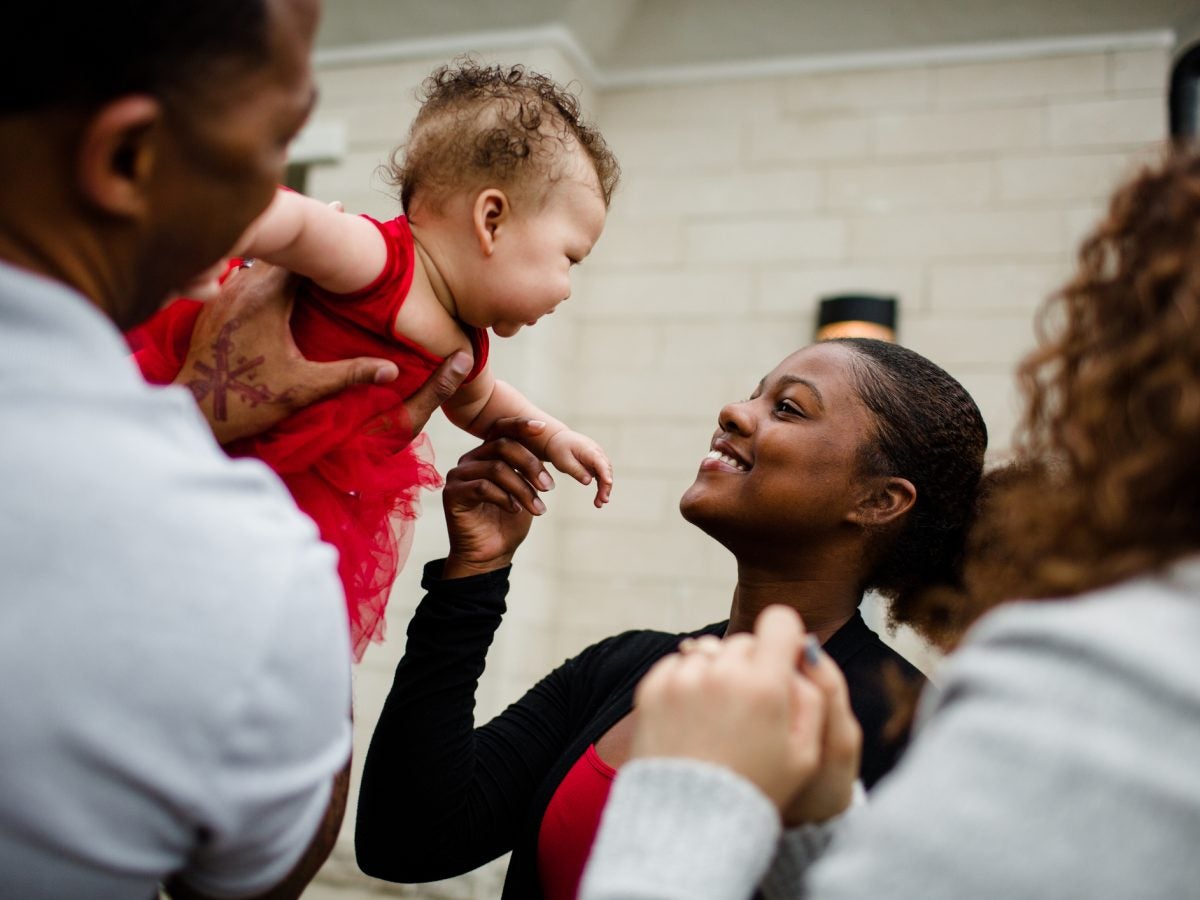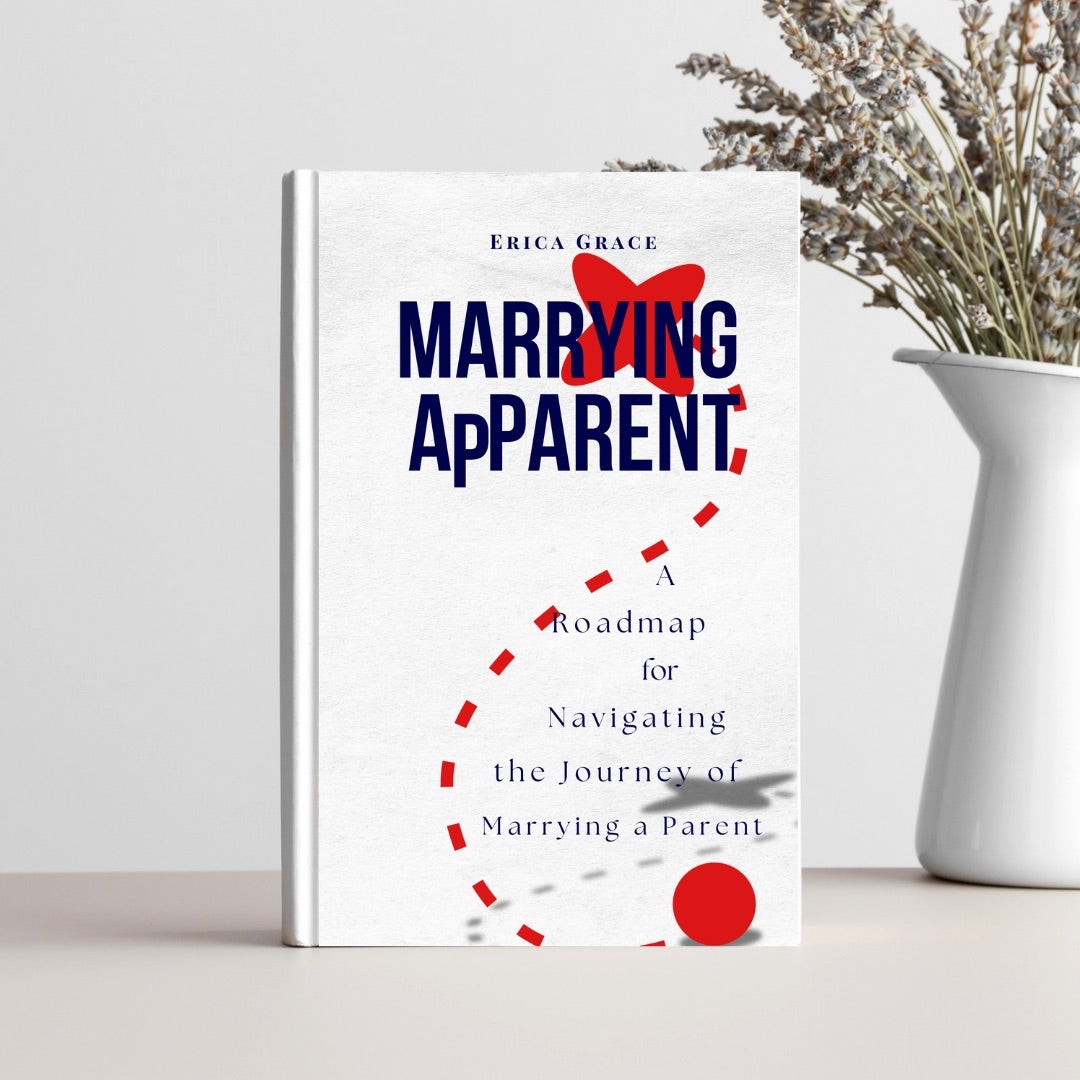
Erica Grace is an author, attorney, and advisor on parental dating who believes that a single person (one with no children) can have a healthy and long-lasting relationship—dare I say marriage—with a parent.
“I would be jaded to say ‘No,’” Grace tells ESSENCE. “I want to be in love again, and I’ve got two children.” The author is a single parent who is also divorced, but her relationship with and expertise in parental dating didn’t begin this way.
The New York native was once single, without kids, and dating a man with a daughter. The couple fell in love, married, and had their own children. Eight years after tying the knot, she chose to move on from the marriage following infidelity. Amid her devastation, Grace chose to turn her sorrow into service. That was the catalyst for her new book, Marrying ApParent. The self-help text was in the works for six years, but divorce was Grace’s motivation to get her insights on paper and out to the world.
“I went into this as a single girl, dating a parent. So this situation allowed me to fully understand the various players in a blended family,” the author tells ESSENCE. “If I can help somebody not be in this situation that I am in—for their marriage not to end because of a lack of boundaries or a lack of preparation—then I feel like I did something with the suffering.”
In Marrying ApParent, Erica Grace provides a “roadmap” for navigating what it takes to be in a high-level commitment with a person who has children, but the author insists that the book is a tool for stepparents, solo parents and single people dating parents alike. It explores themes such as boundary setting, co-parenting, and stepparenting from her perspective and that of interviewees, as their anecdotes are interwoven throughout the text. As single parenthood is more and more common in the United States, with 23% of children living with one parent, there is no question about the text’s relevancy, especially for those in the dating pool.
We spoke with Grace about what people should know if they’re considering dating someone with kids (or even totally against the idea). Here, she discusses things to watch out for, healthy blended families, the grief of leaving a relationship when you’ve become a mother or father figure, and much more.

ESSENCE: You begin Marrying ApParent by discussing your experience as a young single person dating a person with children—what were some of your blind spots that others should watch out for?
Erica Grace: It’s so easy to be blinded in the initial stages of dating. You get blinded by the cuteness of a kid, you get blinded by love, or maybe even just lost in infatuation with a person. This one person that you’re dating, loving or lusting, is telling you things that might not be the full picture. And so, had I been more knowledgeable, and had I known what to look out for, I would’ve seen the flags. In order to have healthy blended families or to have healthy set parenting relationships, boundaries have to be established from the onset. And so that became the meat and potatoes of the book.
As a single person, what are the major considerations when entering into a relationship with a parent?
If you are dating a non-custodial parent, you have to ask if the person you are dating has a parenting agreement. How often are they with their child? Are they spending every other weekend with you rather than their child? If so, that’s a red flag. Do they financially contribute to their child’s life? What is the relationship like between them and the child’s other biological parent? The relationship between the parent, who you are dating, and the child’s other biological parent will take time to discern, but pay attention to their communication. If you’re in the car driving with your partner and the child’s other biological parent calls, does your partner answer? How do these people interact; are they amicable? What are the text messages like between them? You can go back 10 years in text messages with my ex-husband. You’ll see every single conversation we’ve ever had, nothing’s been deleted. And then you’ll see the shift in the nature of our conversations between April 2023, our divorce, and now. After that shift, there is nothing that even remotely implies that I’m romantically involved with him.
If you’re dating a custodial parent, on the other hand, you must understand that your dates are going to have to be scheduled—there isn’t much room for spontaneity. But ask yourself, what is their relationship with their child? How do they interact? What are the respect levels? Is a mother referring to her son as “My king”? What’s their parenting style? How do they discipline their kids? Is that totally different from how you would want to discipline if you had a child together? Keep in mind that this person’s parenting style likely won’t change.
How should one approach dating a parent with kids by more than one person?
Whatever you’re dealing with now, multiply it by two or three. And if your partner has a mess with one ex but not with another, you are still dealing with a mess. I don’t think that people should be counted out of the dating pool because they have several exes, but you better do your due diligence.
In another chapter, you talk about the order of things. You say that in partnership, God comes first, then the spouse, then the children, and finally everyone else. How did you come to develop this order?
When you come from a nuclear family, there’s no question of who comes first in the situation. When you have a blended family, it’s quite different because often, the child existed before your new partner. So it can get weird, especially if, again, there were no boundaries set with that child.
So, if you ever allow your child to reside in the space where your partner should exist, it’s going to get really sticky when you introduce someone new. So if you’re the type of woman who’s referring to your son as your “king,” good luck when you find a new “king” to bring into that space. Or if you are a dad who is enmeshed with his daughter in a way where you confide in her, or she’s doing the dishes or taking care of the younger children, it makes it harder or more difficult for someone to come into that space. You automatically become the evil stepparent because everything is changing now that a new person is coming around. The key to it is you’ve got to be in a real healed space to make sure you’re picking a good partner.
But, yes, your spouse comes before your children. You’ve got to have this union with your spouse, especially when there are young kids at play. You want to be able to make sure you are parenting them together as a unit and that all of the kids, whether they were from a prior relationship or from your union, are being loved the same, disciplined the same, and everything is equal. And if you don’t have that in order, then you will have disorder within your home.
You explore mourning in the book—more specifically, when you break up with the parent, you subsequently break up with their child. But, as you explain, it goes beyond that. What does mourning look like when dating a parent and becoming a part of a blended family?
Oddly enough, the mourning chapter was written before the divorce. It came from me growing up in a nuclear family and having to really grieve that. I always loved my stepdaughter, but I understood that there was always going to be another adult who had a say in what was going on. I also grieved that she wasn’t able to be at every event. I had to grieve that.
Post-divorce, that chapter expanded. So, I think as a single person going into a marriage with someone with kids, you need to grieve that you are not going to have this traditional family. Then, as a solo mom, I had to grieve that my children would need to leave the house and not be with me at times, and that was painful. I wrote a chapter called “Don’t Throw the Baby Out With the Bathwater” because it focuses on what happens when the marriage is over. What happens to my relationship with my stepdaughter? I raised her for eight years. It’s not fair to her, and it’s not fair to my children, her siblings.
What is your hope for this book? What sort of insights or inspirations can you provide for readers, with or without children, who would like to have a healthy, sustainable, long-lasting relationship?
I hope that people who are married are able to use this as a recalibration tool. I hope that parents who are in a relationship with people who have become stepparents really read this book—not just the stepparents. They need to understand their blind spots; maybe they need to give their spouse a voice. Maybe they need to start from scratch in certain ways. I hope that it allows people to recalibrate in a way that they can develop a more healthy union. I also hope that people who are in extremely unhealthy unions have the strength to walk away. There’s a chapter in the book called “Know When to Go.” People should not be in any relationship that is in any way causing them pain. Discomfort is okay, pain is not.
Singles should not go into a relationship, let alone a marriage, with a parent blindly. Ask the questions. And for solo parents, once you get married, the order of things is God, your spouse, and your children. But while you are dating, you are dating for yourself and your children. Pick a partner who makes sense for you and your kid.
